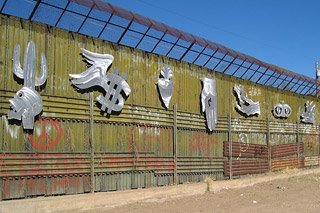For the last 15 years or so I've been making media, especially video, that occupies a position somewhere on a spectrum between high art and news reporting. Swinging from abstract electronic experimentalism to documentaries that report on the human rights atrocities of our times, this variety of work nevertheless has always grappled with a political conciousness and a desire to communicate information and ideas about what is wrong with this world. I currently continue a search for a hybrid form that mixes art and journalism, aesthetics and ethics, in an effort to speak to a variety of audiences on a range of issues, in various formal modes that they might not otherwise expose themselves to.
This evening's program is a selection of work made from 2001 to this year, exposing that mixture of documentation and culture.
Manifesto (10 min, 2001 )
A call to arms, asserting the right of artists and other cultural workers to recycle culture, building new creative works from old ones, a practice that is becoming more and more marginalized by modern intellectual property laws.
American Business Adventures (10 min, 2002)
This video collage tells a story of the connections between the oil industry and U.S. foreign policy.
Cops of the World (5 min, 2003)
A music video for a protest song originally by legendary 60s folk singer Phil Ochs. This version is re-worked and modernized, with lyrics relevant to our current geopolitical moment, by Ryan Harvey from Baltimore. Visuals are culled from a variety of mass and independent media sources.
Boundary Conditions (21 minutes, 2007 work in progress)
This is the latest edit of a work in progress that uses a mixture of original and found footage to explore the topic of borders, both physical and metaphorical, institutional and personal. This cut includes footage of musicians Jose Saavedra and Elise Dubord peforming live music along with the projected video at an event in Tucson, Arizona.
Excerpts from "On The Edge: The Femicide in Ciudad Juarez" (2006)
On The Edge is a documentary covering the brutal murders of hundreds of poor young women in the border town of Ciudad Juárez, Mexico, murders that have been repeatedly ignored and unresolved by police and governments since 1993, despite the continued and persistent efforts of family members and activists to obtain justice for the victims. Rather than provide an easy, murder-mystery style solution to the crimes, the film sets out to explain the social, cultural, and economic factors that have created this situation where the killings can continue, and continue to go unpunished. In addition to explaining the circumstances, On The Edge situates the Juarez killings in the context of wider political and economic trends, showing the audience that this is not just an isolated phenomenon in one far-off city, but a glimpse at a nightmarish future for much of the world, unless something is done to prevent it. Tonight we'll see 2 sections of the film, the introduction (10 minutes) to the film, and the Narcotrafficking (10 minutes) section, which explains one of the most important factors contributing to the problem.
Bio
Steev Hise is an artist, organizer, and media activist originally from Iowa and currently based in Tucson, Arizona (USA). He is actively involved with the Independent Media Center, is a member of the collective that runs Tucson-based Dry River Radical Resource Center, and is on the board of directors of Pan Left Productions, a non-profit video collective. Steev has been been doing a mix of artistic and political video work since 1992, and did graduate study in new media and electronic art at California Institute of the Arts. His work has been presented in Europe, Australia, and North and South America. He is the founder of Detritus.net, a website devoted to artistic appropriation, and his personal website is
